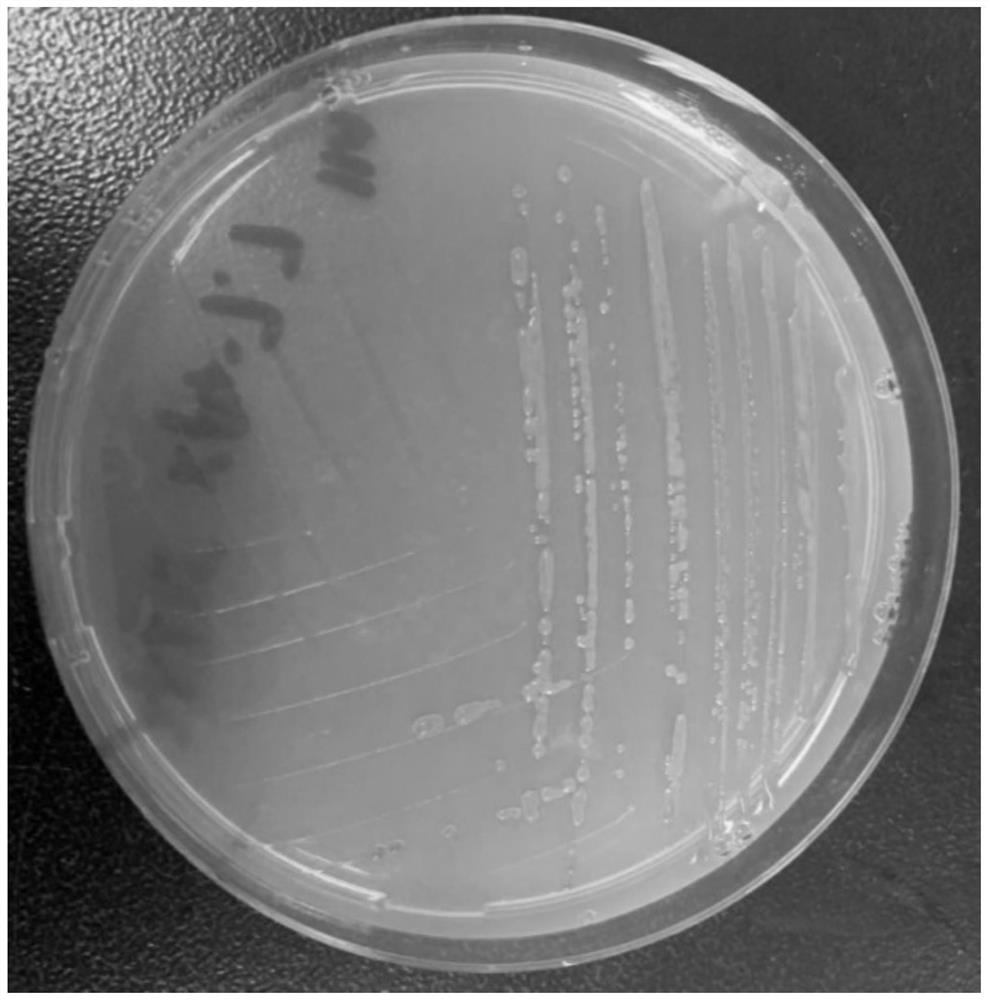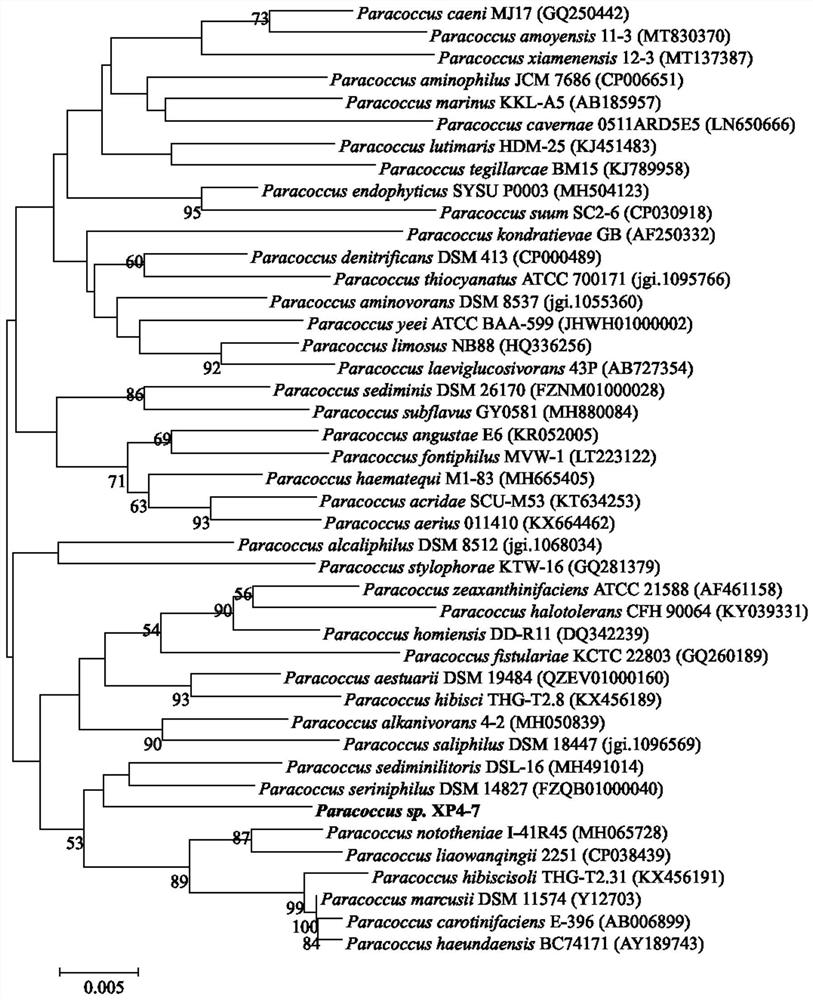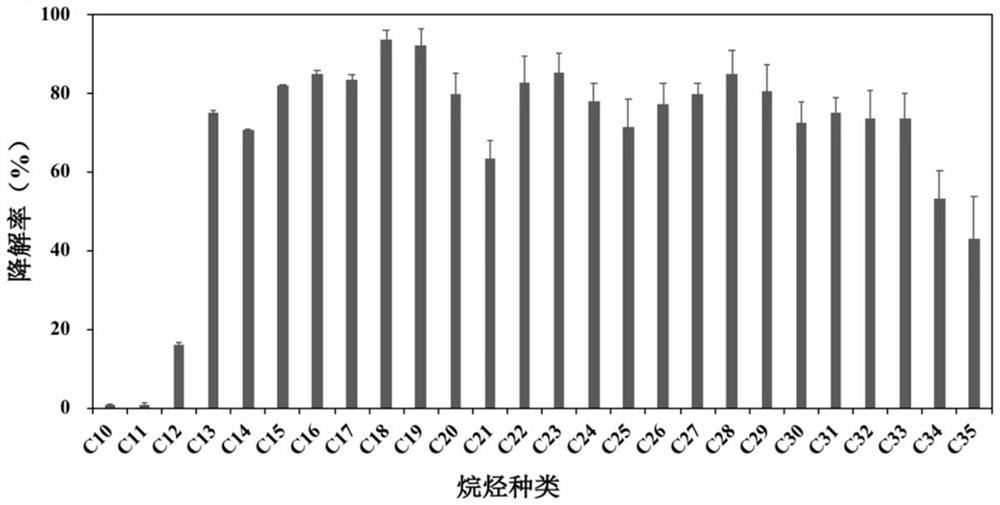Alkane degrading functional bacterium XP4-7 and application thereof
A technology of alkanes and paracoccus, applied in the field of microorganisms, can solve the problems of relatively few researches on petroleum hydrocarbon degradation microorganisms, and achieve the effect of excellent degradation ability
- Summary
- Abstract
- Description
- Claims
- Application Information
AI Technical Summary
Problems solved by technology
Method used
Image
Examples
Embodiment 1
[0022] Example 1, screening and identification of paracoccus (Paracoccus sp.) XP4-7 strain
[0023] Preparation of artificial seawater medium (MMC): Weigh 24g of sodium chloride, 7g of magnesium sulfate heptahydrate, 1g of ammonium nitrate, 0.7g of potassium chloride, 2g of potassium dihydrogen phosphate, and 3g of sodium hydrogen phosphate, dissolve them in 1000mL of ultrapure water, Adjust the pH to 7.4, sterilize with high-pressure steam at 121°C for 20 minutes, add appropriate amount of trace element mixed solution and magnesium sulfate heptahydrate solution after sterilization; trace element mixed solution: weigh 2g of calcium chloride, 50mg of ferric chloride hexahydrate, copper sulfate 0.5mg, 0.5mg of magnesium chloride tetrahydrate, 10mg of zinc sulfate heptahydrate, dissolved in 1000mL ultrapure water, and the trace element mixture was sterilized by filtering through a 0.22μm filter membrane; solution of magnesium sulfate heptahydrate: weigh 35g of magnesium sulfate he...
Embodiment 2
[0027] Embodiment 2, paracoccus (Paracoccus sp.) XP4-7 strain morphological characteristics
[0028] A single colony was streak-inoculated on the MA plate medium and cultured at 28°C for 3 days. The colony of Paracoccus sp. XP4-7 on the MA plate is round, carrot-colored and opaque, with smooth and moist surface, regular edges, no halo, raised in the middle, and 1-2 mm in diameter. see figure 1 .
Embodiment 3
[0029] Embodiment 3, the determination of paracoccus (Paracoccus sp.) XP4-7 strain degrading alkanes
[0030]Prepare artificial seawater culture medium (MMC), sterilize at 121°C for 20 minutes, divide into 40mL glass bottles, 10mL per bottle, add petroleum and diesel oil with a final concentration of 10g / L, and store at 28°C, 150rpm, in the dark Cultivate under the same conditions for 20 days, and determine the residual alkanes before and after the culture by gas chromatography-mass chromatography (GC-MS). The results showed that the degradation rates of Paracoccus sp. XP4-7 strain to total alkanes in petroleum and diesel oil were 48% and 62%, respectively, and the degradation rates of n-decane to n-pentacane in petroleum were 0.9%, respectively. 0.9%, 16.0%, 75.0%, 70.8%, 82.1%, 85.1%, 83.4%, 93.8%, 92.2%, 79.9%, 63.3%, 82.8%, 85.3%, 78.2%, 71.6%, 77.3%, 80.0% , 84.9%, 80.4%, 72.7%, 74.9%, 73.6%, 73.8%, 53.3%, 43.2%, the degradation rates of n-undecane to n-pentacane in dies...
PUM
 Login to View More
Login to View More Abstract
Description
Claims
Application Information
 Login to View More
Login to View More - R&D
- Intellectual Property
- Life Sciences
- Materials
- Tech Scout
- Unparalleled Data Quality
- Higher Quality Content
- 60% Fewer Hallucinations
Browse by: Latest US Patents, China's latest patents, Technical Efficacy Thesaurus, Application Domain, Technology Topic, Popular Technical Reports.
© 2025 PatSnap. All rights reserved.Legal|Privacy policy|Modern Slavery Act Transparency Statement|Sitemap|About US| Contact US: help@patsnap.com



